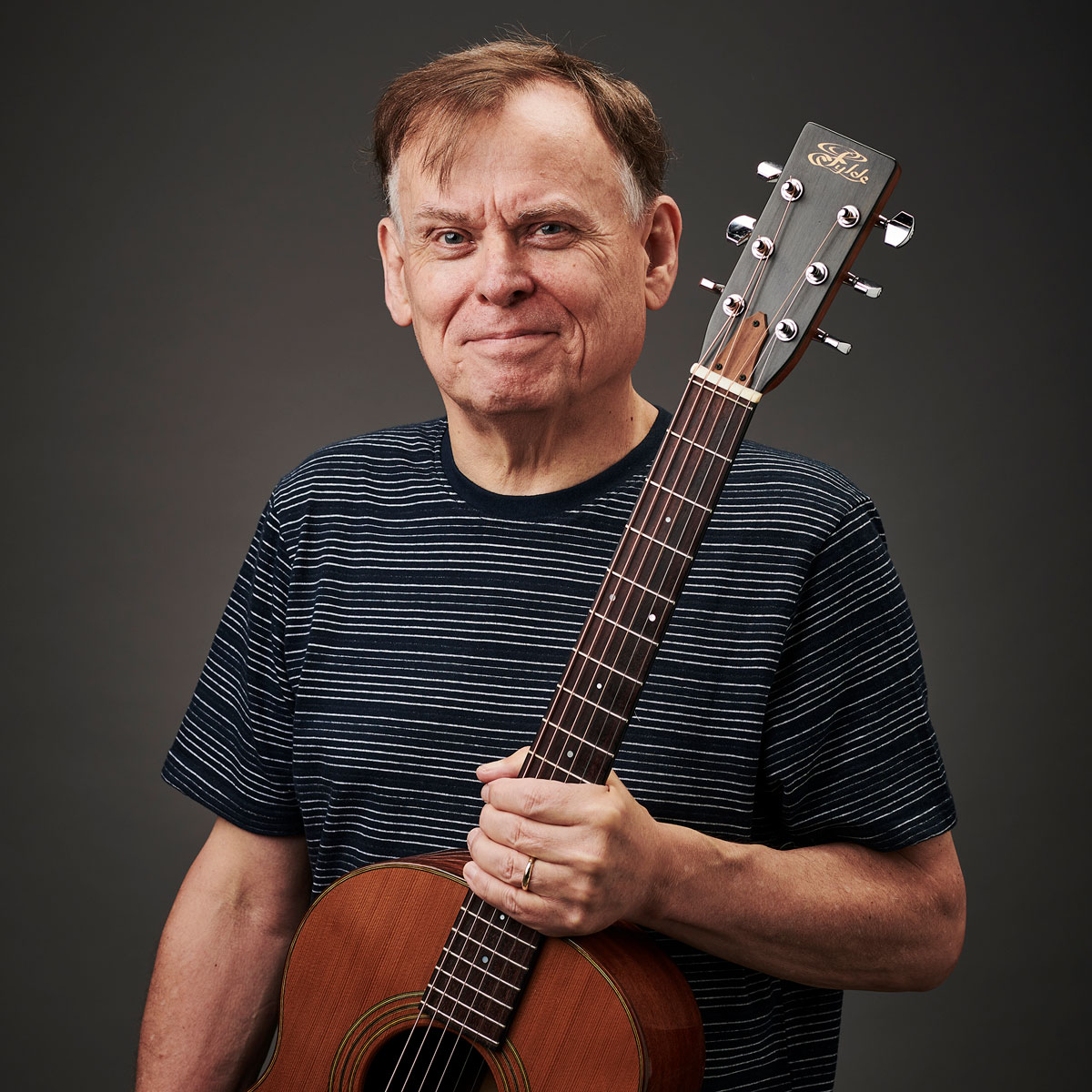Eric Gales on why he is not trying to be the next Jimi Hendrix – and why you shouldn’t be either
The king of blues-rock talks influences, signature gear and the message behind his songs, and explains why any good guitar player must stamp their own personality on their sound
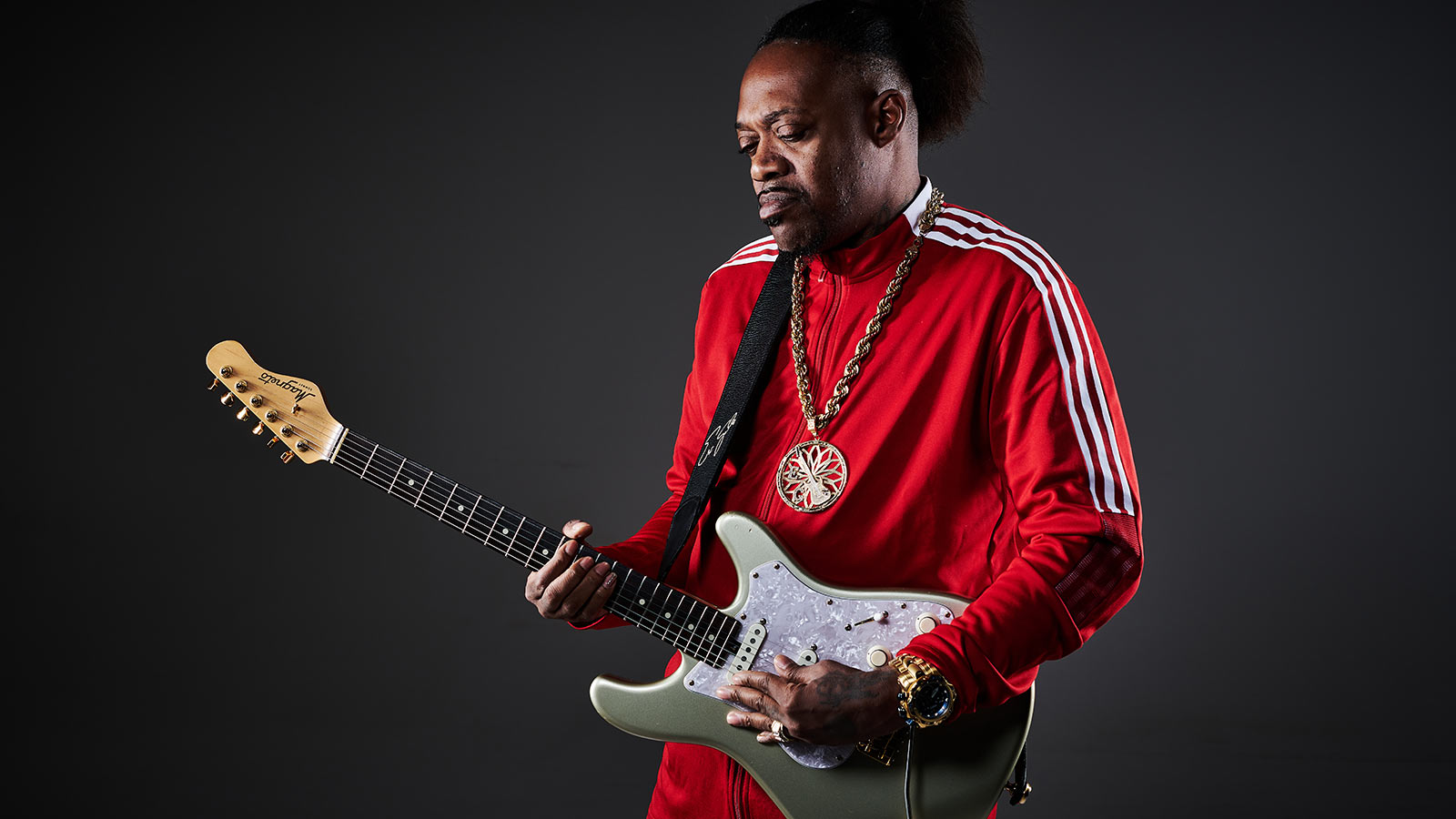
Eric Gales’ new album Crown is the work of an artist at his apex. The chops are staggering, but it’s the songwriting – which delves deep into his painful experiences of prejudice, demons of self-doubt and addiction – that hits you in the gut. Is there anyone to better him right now? We joined him to find out...
Anyone who has witnessed Eric Gales live will agree that he fully deserves his newfound status as blues-rock royalty.
But his guitar vocabulary extends way beyond just those domains as it incorporates elements of jazz, funk, soul and gospel within its compass, all channelled into what he describes as his “upside-down and backwards” playing style.
Touring to promote his new album, Crown, he recently wowed audiences across the UK with the unstoppable force of his live performance, a canny blend of showmanship and unbelievable chops.
“Everybody is actually blown away, man,” he tells us as we settle down in the studio. “And the response and the emotion that has been displayed by the audience receiving the material live has been awesome. Everybody’s been really enjoying it.”
Lyrically, the album explores areas that are at once both old and familiar and shockingly contemporary.
“It’s inspirational to watch actually, to see the tears come in people’s eyes when I’m playing and singing these lyrics,” he continues. “Predominantly, a lot of people come to the shows to see the guitar playing, but at the end of it they are moved by the things that I have to say. It’s a one-two punch, doing everything that I can to try to help change the world.”
Get The Pick Newsletter
All the latest guitar news, interviews, lessons, reviews, deals and more, direct to your inbox!
No-one is less than nobody – we’re all equal, we’ve all got parts to contribute. When the whole world can view it like that, then you can begin to be a better place
To say that Crown’s release was eagerly awaited would be an understatement. As with many recent projects it was stalled by the onset of the pandemic.
“We made wise use of our time and we even delayed the record coming out for a year because I didn’t want it to be released and not being able to fully promote it and tour and everything,” Eric remembers. “So we held off until this year. It’s been anticipated for quite some time and I hope it was worth the wait.”
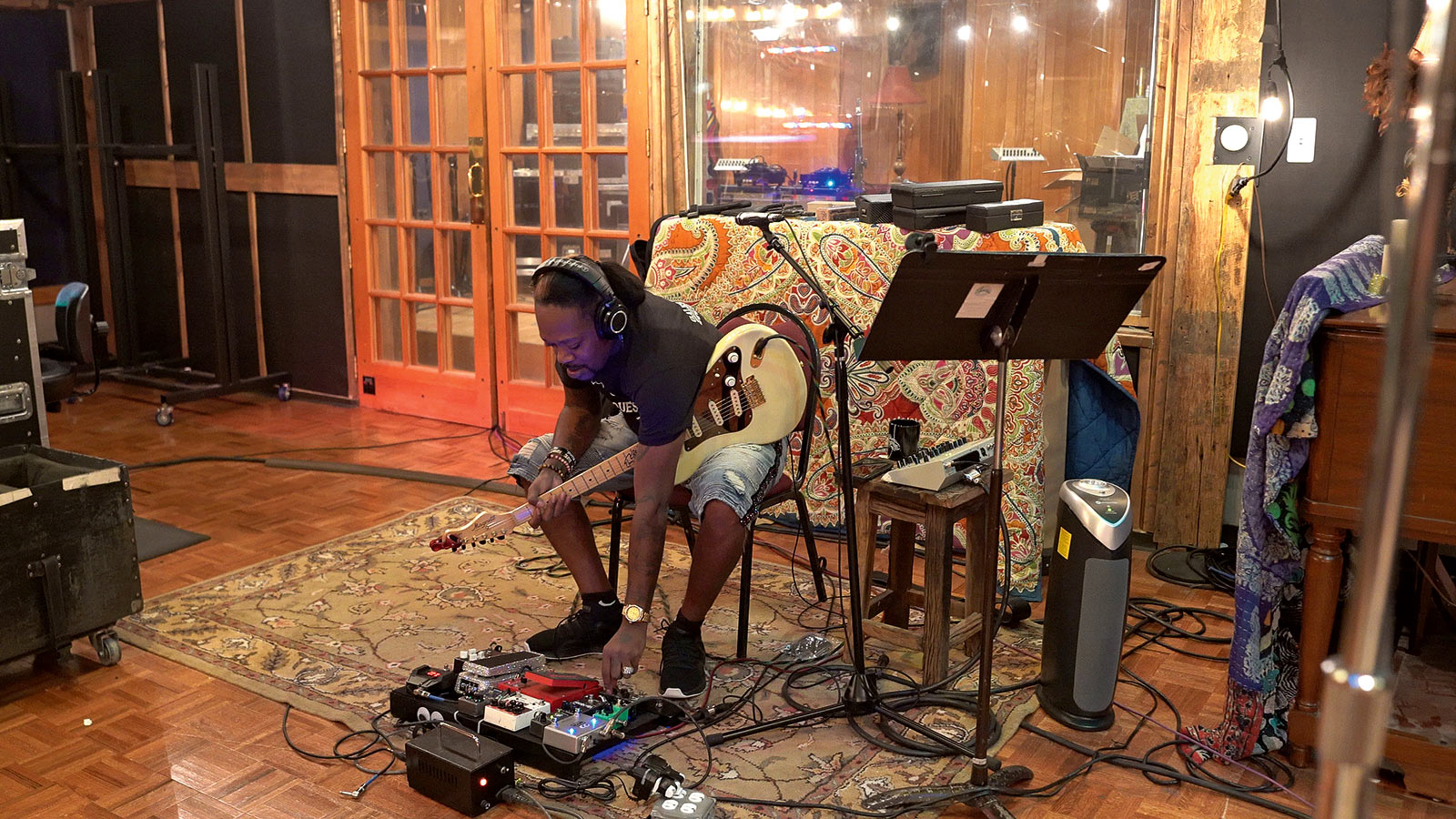
Unleashed to the world at the beginning of the year, the album has proven to be not only worth the wait but something of a game-changer for Gales with the prize finally in sight and a coronation imminent...
Would you say that Crown is very autobiographical in a lot of ways?
“It’s very autobiographical. The writing was taken from the state the world is in and it’s been in for quite some time as it relates to race and equality and things like that. We felt like it was important to get that message across on this record.”
What is the central message of the new album?
“That we’re all here for a purpose. No-one is less than nobody – we’re all equal, we’ve all got parts to contribute. When the whole world can view it like that, then you can begin to be a better place.”
I play left-handed, but I write right-handed. I just picked [the guitar] up and that was what was comfortable
What got you into playing guitar in the first place?
“Man, music was inevitable. My brothers were already playing and I got to be turned on to Albert King and Muddy Waters and Hendrix and Stevie Ray and just a whole cast of different players.
“I was going to church every week because my mum and dad were heavily religious, and so I was in the church and I began to play in the church. I was listening to blues and rock and everything. So that was basically what my household was like coming up: traditional gospel, blues, rock, funk...everything.”
Are you actually left-handed?
“I play left-handed, but I write right-handed. I just picked [the guitar] up and that was what was comfortable. I picked the guitar up when I was about four years old, so [I wasn’t even thinking] which way to play it. That’s what felt comfortable to me and, ironically, my brothers play the same way.”
Did you inherit a guitar from your brothers?
“Yeah, it was passed down. I’m the youngest of five brothers and it was passed down from my uncles to them. Cousins and aunts and uncles and everybody was playing, you know, my mom and dad and all of them. They had a gospel group, so it was like everywhere, it was all over me.
“That’s why I say music was inevitable, seeping into all of us in some kind of way. First thing I learnt to play was some Albert King stuff, you know, topped with gospel music, just basic church, praise and worship type of music and things like that. That was where the egg was hatched.”
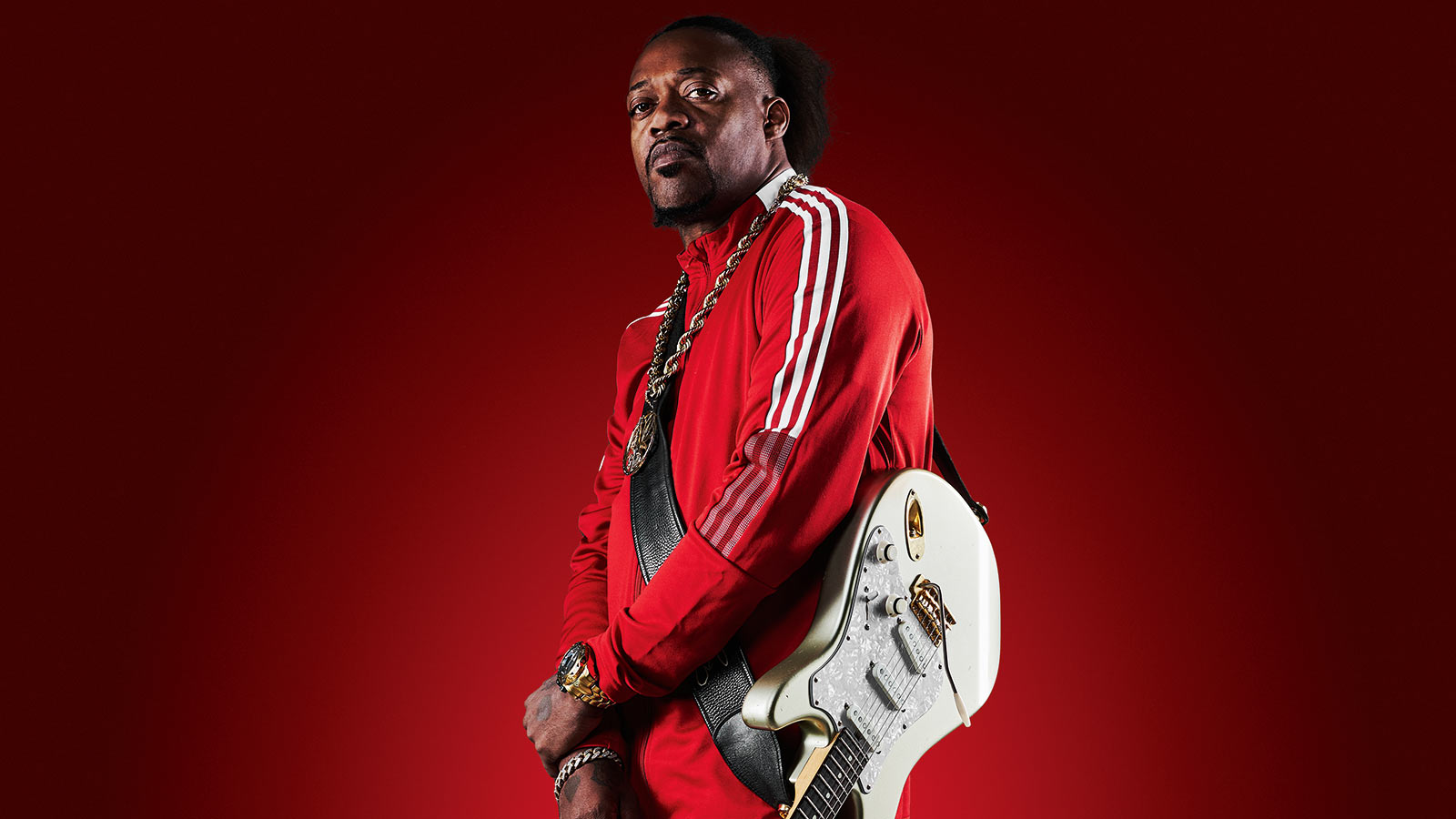
Early Eric...
When was the first Eric Gales Band formed?
“Oh my, the first Eric Gales Band happened when I was 14 years old. But I did a battle of the bands around the town when I was like 11 in my brother’s band. So it started there. And then, when I was 14, my brother said, ‘Let’s turn this into The Eric Gales Band... and you’re going to be the frontman.’”
What sort of material were you playing back then?
“It was all original. The first two Eric Gales Band CDs were all originals, except we did a rendition of I Want You (She’s So Heavy) on the Picture Of A Thousand Faces record in ’93.”
When did you first come across Hendrix?
“Day one. I mean, my brother was hugely influenced by Hendrix, so he was definitely one of the ones I was introduced to. But I began to be more influenced by people that were influenced by Hendrix more than him. You know, you can’t get around him being the top of the tree, but there’s people ahead of him, such as Buddy Guy, Curtis Mayfield, Albert King, Lightnin’ Hopkins and Robert Johnson.
Hendrix is a huge part of everybody’s style and they’re lying if they say that he ain’t
“It’s who you are influenced by that automatically makes you acquire who they were influenced by. It’s just evolution. So, Hendrix, you know, there’ll never be another him. I just do my best not to be the next him, and I just do my best to be the first me. And that is honoring him, by showing how his legacy made me be who I am.
“Hendrix is a huge part of everybody’s style and they’re lying if they say that he ain’t, but the object is – how does it help mould you into being the best in you? Because, at the end of the day, what’s going to stay and stick is your DNA. No-one has a DNA like yours. So what type of imprint are you leaving? Is it an imitation of an imprint of somebody you like, or is it your own? And that’s what matters.”
As you progressed, these other influences started to come through. There’s a lot of jazz in your playing, particularly in your chord voicings. Who were you listening to at the time?
“Wes Montgomery, George Benson, Herb Ellis, Kenny Burrell, Grant Green, Jonathan Butler... All of those guys, man, were people that my brother was hipping me on to. And I just took it in, it was amazing. There are plenty that I’m probably leaving out that contributed as well. But there are a lot of known and unknown musicians out there who contributed to the whole pot of inspiration.
“I was basically just at home and listening to their records. YouTube wasn’t even around back then, so it was just dropping the needle on the record and trying to pick it out.”
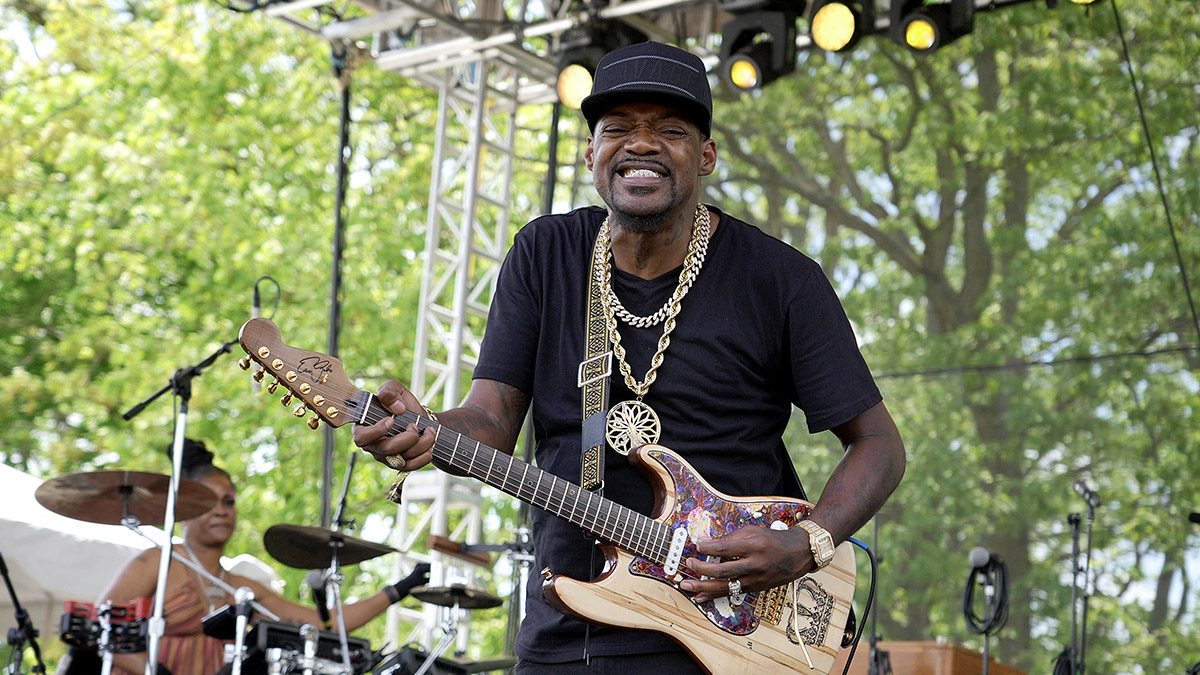
So all of these different guitar styles poured into your guitar playing, but blues was basically the core?
“Yeah, it’s the main ingredient that is common in all of it. Everything else is just spices that’s thrown in sporadically with no rhyme or reason, no motive, no process. That’s totally a feeling thing. It’s very hard to dictate that.”
Gospel is a religious person’s blues because it’s pain, it’s suffering, it’s all kinds of things they spoke about in gospel, but it’s the same
You once said that there are a lot of similarities between gospel and the blues.
“Absolutely, yeah. Music-wise, it’s the same sensation, the same emotion that you get. Just two different types of words, you know, blues and gospel, but musically, the effect emotionally, it’s exactly the same. Gospel is the religious man’s blues. That’s what it is. I’ve never thought about that before, but that’s exactly what it is.
“Gospel is a religious person’s blues because it’s pain, it’s suffering, it’s all kinds of things they spoke about in gospel, but it’s the same. Because pain, suffering and all kinds of things are talked about in blues. So blues is the world man’s [music] and gospel is a religious person’s blues.”
Signature sounds
What gear did you use when you were recording Crown?
“In the studio I used my signature DV Mark Raw Dawg [guitar amp] blended with a little bit of Dumble that was provided by Joe Bonamassa. I used the RawDawg Magneto [guitar] predominantly for the record and I used my pedalboard that has a Cry Baby wah, a DigiTech Whammy pedal, a Colossus fuzz made by Mojo Hand, a [EWS] Brute Drive made by Xotic Pedals, a Tech 21 [Boost] DLA, the Raw Dawg Boost Drive made by MXR and an Octavio MXR fuzz.”
I’ve had Les Pauls and I even have a Flying V and SGs, Paul Reed Smiths. But my particular preference is more of a Strat style
When did you first discover Magneto guitars?
“I would say it was about 13 or 14 years ago, and I’ve been liking them ever since. They kind of discovered me, man. I had a conversation with Chris [Hatstatt], president of Magneto Guitars, and he said, ‘Man, I got something I think you’ll like,’ and I tried it out.
“At that time, I was going through some things and other companies really didn’t want to deal with me – but he did and I never forgot that. We just continued to build our relationship, and I never will forget the fact that he was always in my corner.”
What sort of features were you looking for on your signature guitar?
“Oh, there’s the bells and whistles, being draped in gold and all this, but nothing different to the original one that I was playing: ‘Give me that, but let’s engrave my name in the neck...’ and stuff like that and putting my nickname, Raw Dawg, on the back of it. But I like the tone of the Jason Lollar pickups that were in them, they sounded great and we just dressed it up a little bit more to look flashy, like I like to be.
“I would have played it like it was, but he was like, ‘Let’s do a signature. What would you want to see?’ I told him and boom, boom, boom. Basically, we doctored up the Eric Gales model.”
Just two controls – master volume and tone?
“Yeah, a master tone with one tone knob that works on all three pickups in all positions. It’s just a little more convenient, to be honest with you. I mean, one tone knob working all three pickups is a little more convenient than mixing and blending two tone knobs on the traditional Strat. I’m not unaccustomed to working with that, it’s what I worked with for years.”
Were you playing Strat-style guitars from the outset?
“Oh yeah, I’ve always been more connected to a Strat style. I mean, I’ve had Les Pauls and I even have a Flying V and SGs, Paul Reed Smiths. But my particular preference is more of a Strat style.”
How did you go about developing your signature DV Mark Raw Dawg amp?
“Just basically had a conversation with Marco [De Virgiliis, DV Mark owner and amp designer] and told him I wanted something crystal clean and loud. I wanted it to be not too heavy and he made it all happen with the signature model. Treble, bass, midrange, volume and reverb, which I rarely use, but it’s there.
“As to the cabinet, I chose a cabinet with two neo [neodymium] 12-inch speakers in, I think they’re 60 watts. I used two generally, but I often like to run four cabinets as well. It’s not about the volume, it’s just about the dirt that it gives, you know? That’s a pretty well oiled machine for me with that combination of the pedalboard and the guitar, and I can take that anywhere and take care of business.”
What does the immediate future hold for you?
“A whole lot more touring, supporting this record, getting this message of I Want My Crown out to everybody. Meanwhile, riding forward is getting some material together and just keep going forward, man, and trying to shape the world [with] every gig, every note that I can.”
Eric Gales’ new album, Crown, is out now via Provogue
With over 30 years’ experience writing for guitar magazines, including at one time occupying the role of editor for Guitarist and Guitar Techniques, David is also the best-selling author of a number of guitar books for Sanctuary Publishing, Music Sales, Mel Bay and Hal Leonard. As a player he has performed with blues sax legend Dick Heckstall-Smith, played rock ’n’ roll in Marty Wilde’s band, duetted with Martin Taylor and taken part in charity gigs backing Gary Moore, Bernie Marsden and Robbie McIntosh, among others. An avid composer of acoustic guitar instrumentals, he has released two acclaimed albums, Nocturnal and Arboretum.
“It combines unique aesthetics with modern playability and impressive tone, creating a Firebird unlike any I’ve had the pleasure of playing before”: Gibson Firebird Platypus review
“I met Joe when he was 12. He picked up a vintage guitar in one store and they told him to leave. But someone said, ‘This guy called Norm will let you play his stuff’”: The unlikely rise of Norman’s Rare Guitars and the birth of the vintage guitar market
